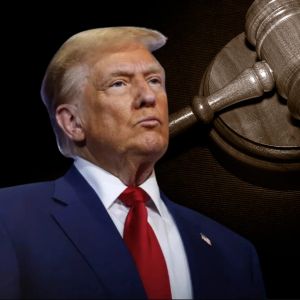Federal court weighs first legal challenge to Trump’s ‘Liberation Day’ tariffs
4 min read
A federal court has invalidated the sweeping global tariffs imposed by President Donald J. Trump. According to the Court of International Trade ruling, an emergency law invoked by the White House does not provide unilateral authority to impose tariffs on nearly every country. The ruling offers a major check on executive power and could have long-lasting implications for the US trade policy. The Manhattan-based court said the US Constitution grants Congress exclusive powers to regulate commerce with other nations. This is not superseded by the president’s remit to safeguard the economy. The lawsuit, filed by the nonpartisan Liberty Justice Center on behalf of five small US businesses that import goods from countries targeted by the duties, was the first major legal challenge to Trump’s tariffs. According to the firms, the tariffs will hurt their business. Federal court weighs first legal challenge to Trump’s ‘Liberation Day’ tariffs The lawsuit is one of seven court challenges to Trump’s tariff policies, along with challenges from 13 U.S. states and other groups of small businesses. The hearing at the Court of International Trade in Manhattan marks the first time a federal court has addressed the legality of President Trump’s “Liberation Day” tariffs. Earlier this month, Jeffrey Schwab, a lawyer from the conservative Liberty Justice Center representing the plaintiffs, argued that the case is straightforward. He stated that the International Emergency Economic Powers Act (IEEPA) — a 1977 law granting the president authority to regulate commerce during national emergencies — does not empower Trump to impose tariffs unilaterally. Schwab further contended that Trump’s declared emergency, based on trade deficits, fails to meet the legal criteria of an emergency, which must be brief, rare, and not ongoing. He then noted that the case is so far outside what constitutes an emergency or an unusual and extraordinary threat that this Court can easily rule it is not an emergency. When the three-judge panel — appointed by Presidents Obama, Trump, and Reagan — asked for guidance on the legal standards to apply in their decision earlier this month, Schwab urged them not to overcomplicate matters. “I’m asking this court to be an umpire and call a strike. You’re asking me, where’s the strike zone? Is it at the knees or just below? I say it’s a wild pitch, far off the plate, hitting the backstop — no debate needed.” The lawsuit was filed in April by a group of small businesses — including a New York liquor distributor, a Utah pipe company, a Virginia electronics store, a Pennsylvania tackle shop, and a Vermont cycling company. These businesses rely heavily on imports from countries such as China and Mexico and argued that Trump’s tariffs represent an unprecedented power grab that would cause irreparable harm . They maintained that the IEEPA does not grant the president the authority to impose tariffs like those announced, which included a broad tariff rate plus higher rates on certain countries. They described the national emergency Trump cited as “a figment of his own imagination,” pointing out that the US has run massive trade deficits for years without suffering economic damage. “If such power were granted by statute, it would represent an unlawful delegation of legislative authority to the executive branch without any clear limit on discretion,” the plaintiffs argued. At the beginning of May, Department of Justice lawyers countered, asserting that Congress does allow the president to impose some tariffs and that Trump’s invocation of a national emergency expands that authority, justifying the broad tariffs. They warned that a court order blocking the tariffs would unlawfully interfere with the president’s constitutional and statutory authority. “Plaintiffs’ proposed injunction would be an enormous intrusion on the President’s conduct of foreign affairs and efforts to protect national security under IEEPA and the Constitution,” the DOJ stated. States and businesses take Trump’s tariffs to court in landmark trade dispute At least six separate lawsuits have challenged Trump’s tariffs, including one filed by California and a coalition of twelve state attorneys general. While many were initially filed in district courts they were gradually transferred to the Court of International Trade. In April, the court rejected an emergency request for a temporary order to block the tariffs, finding that the businesses failed to prove that “immediate and irreparable harm” would stem from the tariffs. A three-judge panel conducted the hearing: Gary S. Katzmann, Timothy M. Reif, and Jane A. Restani — appointed by Presidents Obama, Trump, and Reagan, respectively. Located in a corner of New York’s Foley Square, the Court of International Trade has nationwide jurisdiction over trade disputes. It typically handles niche issues, such as honey customs and mattress imports. Tuesday’s oral argument promises to be the court’s most high-profile hearing in recent memory. Cryptopolitan Academy: Want to grow your money in 2025? Learn how to do it with DeFi in our upcoming webclass. Save Your Spot

Source: Cryptopolitan



